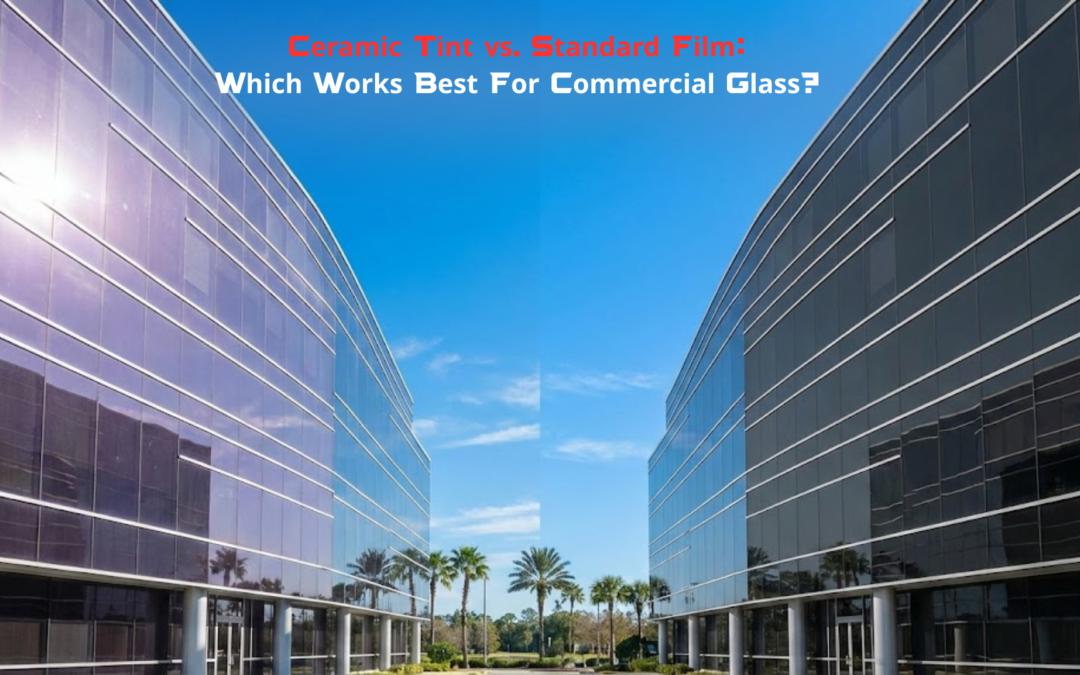Jacksonville’s intense Florida sun, high temperatures, and demanding climate create unique challenges for commercial property owners and managers. Whether you’re managing an office building, retail storefront, governmental facility, school, or hospital, the condition and efficiency of your commercial glass tinting directly impacts employee comfort, energy costs, and the longevity of your interior assets.
Commercial window tinting comes in two primary forms: Ceramic window tint and standard film. These are the solutions available to Jacksonville businesses today. But how do you know which one is right for your specific situation?
This comprehensive guide breaks down the differences between ceramic tint and standard film, explores their performance in Jacksonville’s climate, and helps you make an informed decision regarding commercial window film installation that aligns with your business goals and budget.
- The Short Answer: Ceramic window tint is generally the superior choice for commercial glass applications in Jacksonville, offering exceptional heat rejection, UV protection, durability, and aesthetic appeal. However, standard films remain a viable option for businesses with immediate budget constraints or short-term leasing arrangements.
Understanding Window Tinting Technology
What is Ceramic Window Tint?
Ceramic window tint uses advanced nanoceramic particles to create a protective layer on your commercial glass. This cutting-edge technology provides top-tier solar and thermal protection without the drawbacks of color distortion, reflective surfaces, or electronic signal interference. Unlike older technologies, ceramic films employ non-metallic components that remain stable and effective for over a decade.
- Key characteristic: Ceramic tints work by absorbing infrared radiation rather than reflecting it, keeping your interior spaces cooler while maintaining visual clarity and aesthetics.
What is Standard Window Film?
Standard commercial window film encompasses three primary types found in a typical commercial window tint roll:
- Dyed Films: Use organic dyes to absorb solar heat. These are the most affordable option but fade relatively quickly, typically lasting 2-3 years in Florida’s intense sun.
- Metallic Films: Contain metallic particles that reflect solar heat. While effective, they can create a reflective, mirror-like appearance and may disrupt electronic signals (GPS, WiFi, cell phones).
- Carbon Films: Use carbon layers for heat rejection without the reflective quality of metallic films. Carbon films offer a middle ground in performance and durability, typically lasting 3-5 years.
- Key characteristic: Standard films are generally less expensive upfront but require more frequent replacement and offer moderate protection compared to ceramic alternatives.
Ceramic Tint vs. Standard Film: Performance Metrics
Heat Rejection and Cooling Efficiency
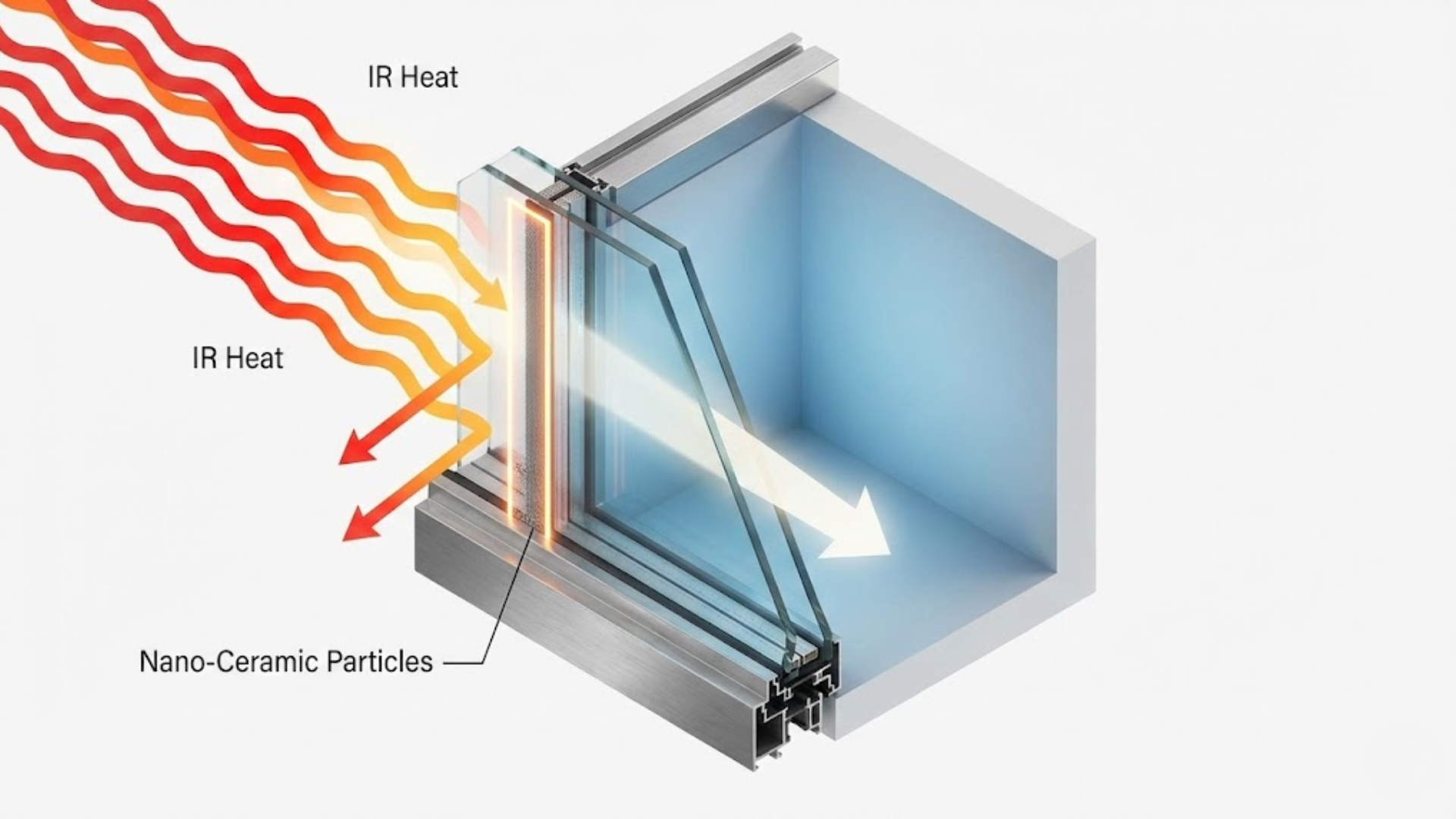
Ceramic Tint
Blocks up to 60-80% of solar heat, significantly reducing the thermal load on your building’s HVAC system. For Jacksonville businesses, this translates to tangible reductions in air conditioning costs, especially during the sweltering summer months.
Standard Film
Blocks 30-50% of solar heat, providing moderate cooling benefits but requiring greater reliance on mechanical cooling systems.
Jacksonville Advantage: With average summer temperatures regularly exceeding 90°F and peak solar radiation hitting 1000+ watts per square meter, the superior heat rejection of ceramic commercial window tints becomes a financial asset rather than a luxury.
UV Protection
Ceramic Tint
Blocks up to 99% of harmful ultraviolet rays, providing maximum protection against fading and material deterioration.
Standard Film
Blocks 50-95% of UV rays, leaving some damaging radiation to penetrate your interior spaces.
Why This Matters: Jacksonville’s position at 30°N latitude means high year-round UV exposure. Unprotected interiors experience accelerated fading of furniture, carpets, artwork, and merchandise, costs that compound rapidly in commercial settings.
Durability and Lifespan
Ceramic Tint
Maintains integrity for 10-15 years, resisting bubbling, color changes, and peeling. This extended lifespan minimizes operational disruptions from replacements.
Standard Film
Typically lasts 2-5 years, with degradation accelerating in Florida’s humid, high-UV environment.
Electronic Signal Interference
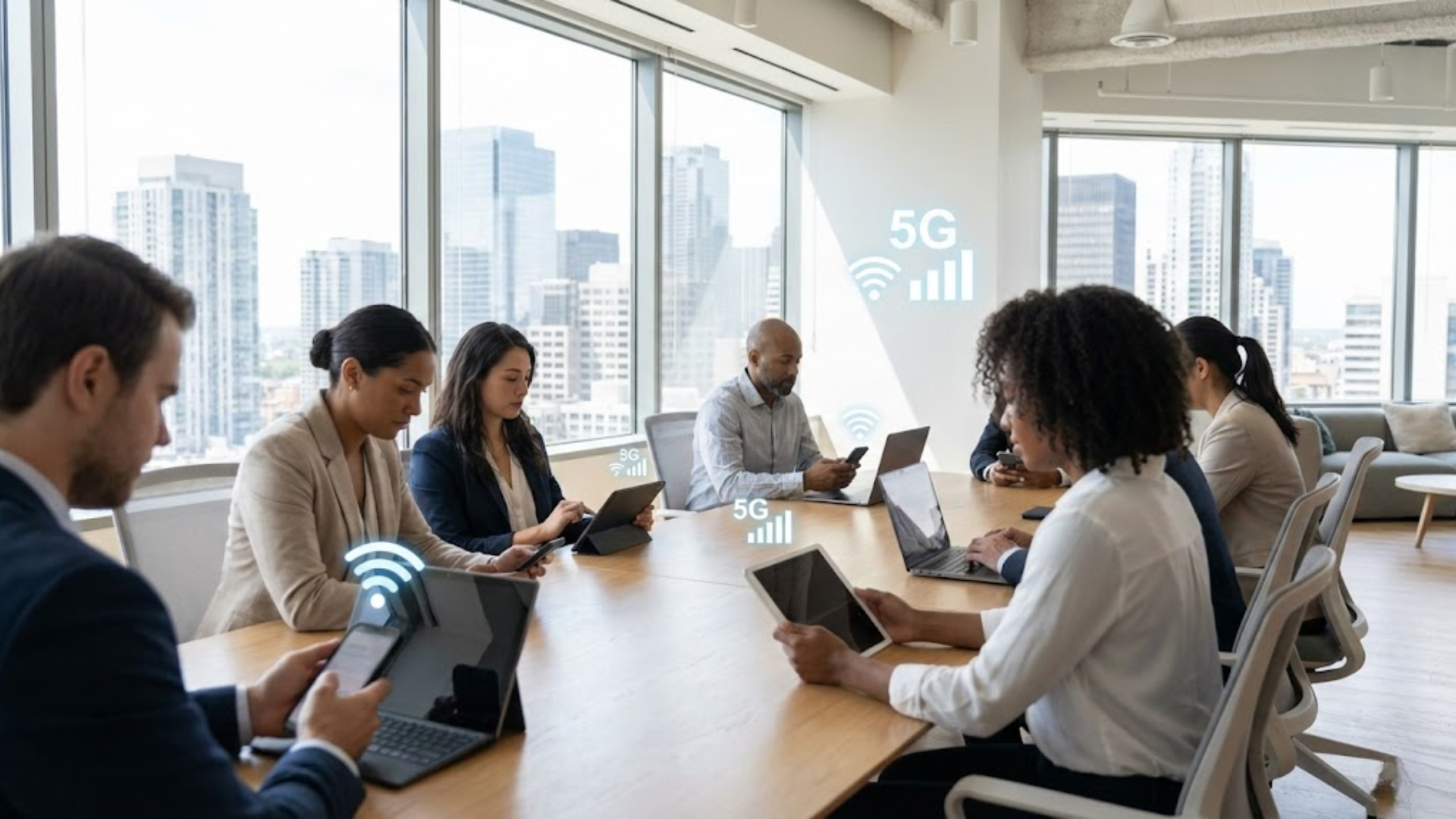
In modern office building window-tinting scenarios, connectivity is crucial.
- Ceramic Tint: Produces no interference with electronic devices, GPS systems, WiFi routers, cell phones, or radios.
- Standard Film: Metallic variants can disrupt cellular, GPS, and WiFi signals—a significant concern for modern commercial environments.
Aesthetic Impact
Ceramic Tint
Maintains a non-reflective, clear appearance that blends seamlessly with architectural glass. The interior remains visually transparent, and the exterior shows no distracting mirror effect.
Standard Film
Often produces a reflective, tinted, or colored appearance that can distort views. Metallic films create a mirror-like effect, while dyed films darken glass noticeably. These visual changes can impact storefront appeal and branding.
Privacy Options
- Ceramic Tint: Provides privacy without reducing clarity. Commercial window frosting, decorative, or tinted ceramic options maintain interior visibility while controlling exterior views.
- Standard Film: Can provide privacy but often reduces interior clarity, making spaces feel darker or more enclosed.
Why Jacksonville’s Climate Demands Superior Tinting
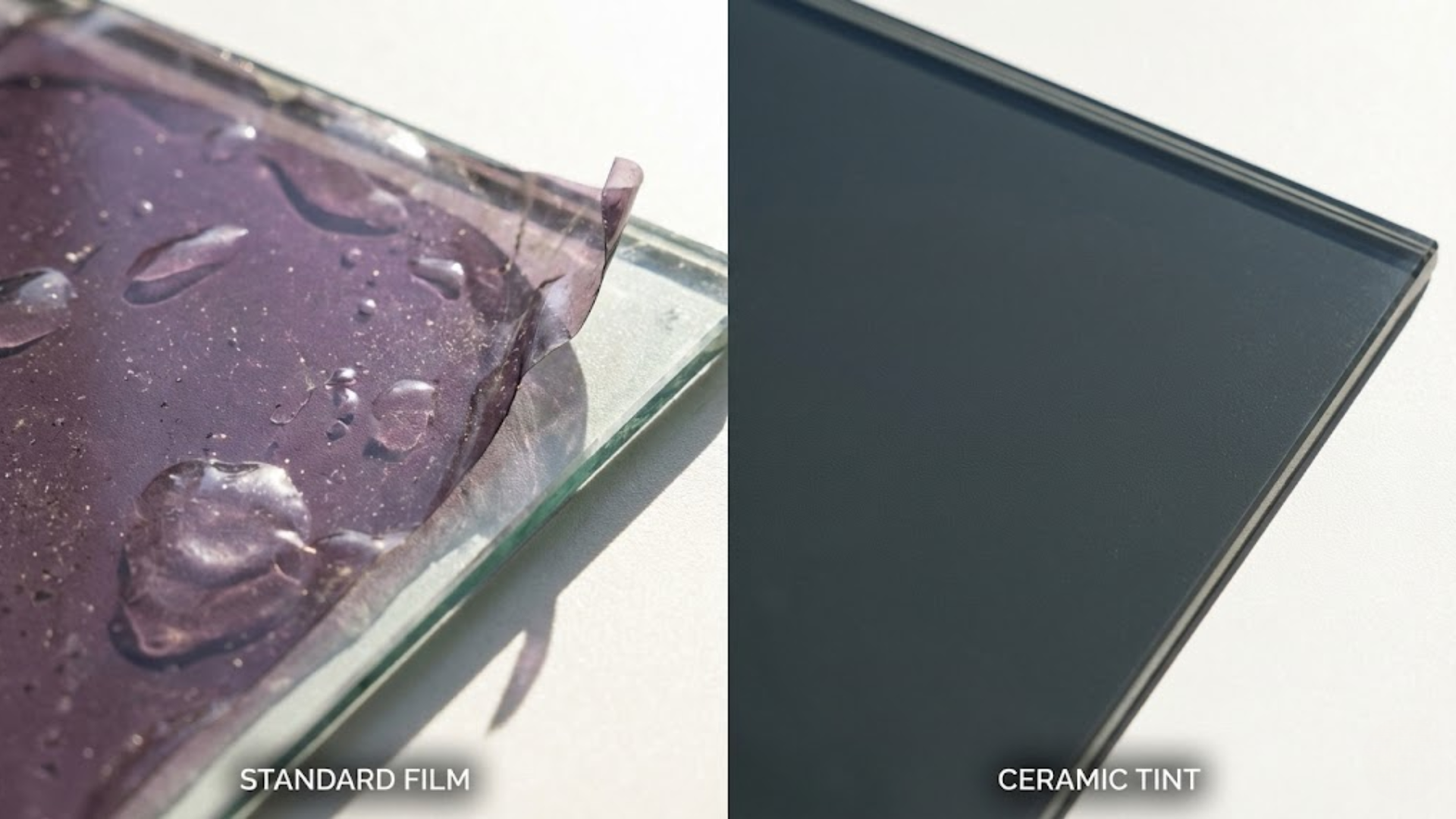
Jacksonville’s subtropical climate presents specific challenges that make commercial tinting selection critically important:
- Intense Solar Radiation: Jacksonville receives approximately 220 days of sunshine annually. Peak solar intensity creates demands that standard commercial tint struggles to meet.
- Heat Accumulation: Average summer temperatures reach 92°F, with heat indices frequently exceeding 105°F.
- Humidity and Moisture: Florida’s humid climate accelerates material degradation. Standard films are susceptible to bubbling and edge peeling, while ceramic tints resist these stressors.
Cost-Benefit Analysis: Ceramic Tint Investment
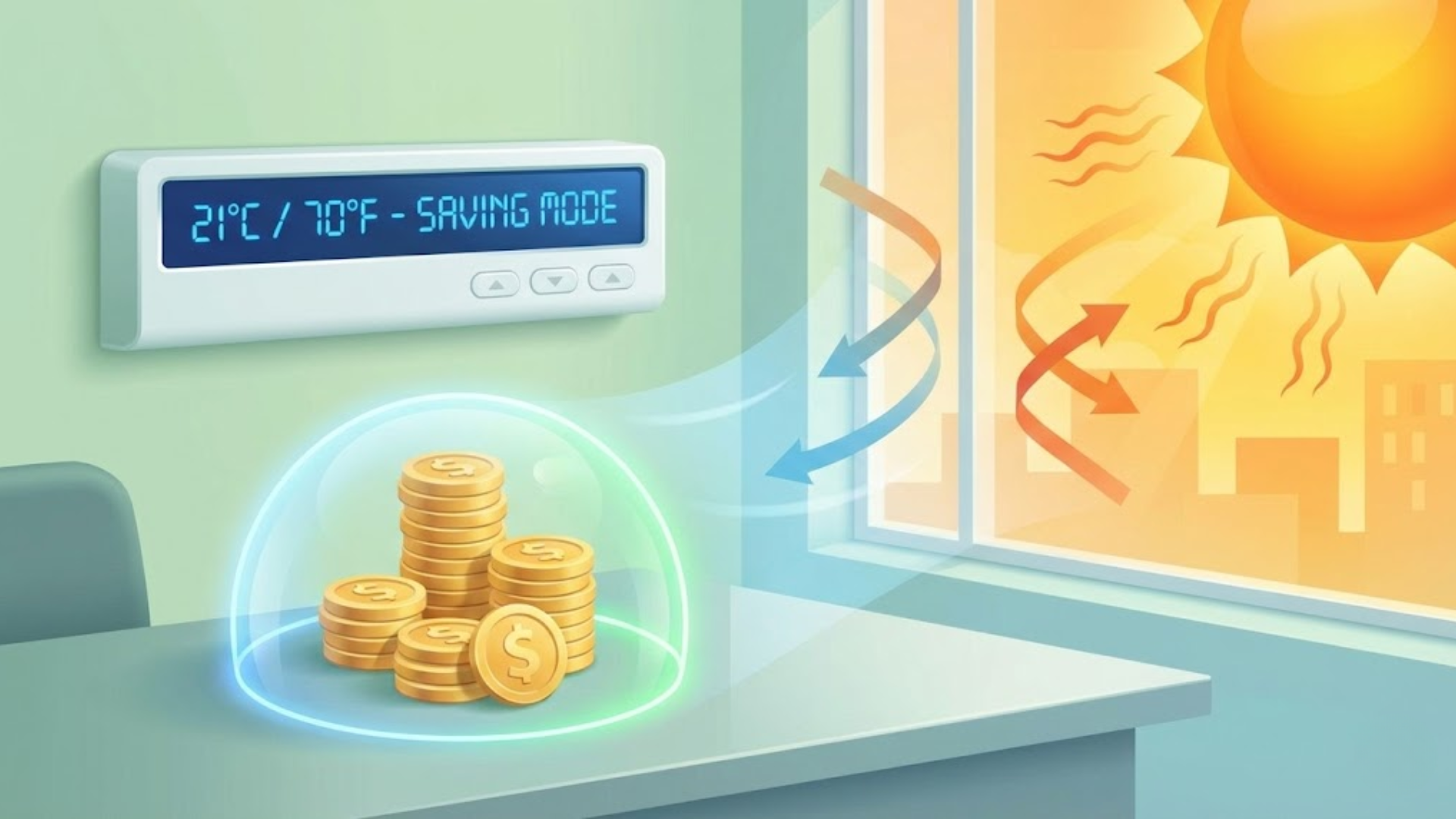
Initial Investment
Ceramic window tint installation costs more upfront than standard film. For a typical 5,000 sq. ft. commercial property:
- Ceramic tint: $25,000-$75,000 (Approx. $5-$15 per sq. ft.)
- Standard film: $5,000-$25,000 (Approx. $1-$5 per sq. ft.)
Long-Term Savings and ROI
Despite higher initial costs, ceramic commercial residential window tinting solutions deliver superior financial performance through:
- Energy Savings: A reduction in cooling costs of 15-30% is achieved annually.
- Maintenance Costs: Ceramic tint’s 10-15 year lifespan eliminates multiple replacement cycles associated with standard film.
- Payback Timeline: Most Jacksonville commercial clients achieve positive ROI within 3-5 years.
When Standard Commercial Film Makes Sense
Standard film remains a viable window tint for commercial windows in specific scenarios:
- Short-Term Leases: If your lease terminates within 3-5 years.
- Tight Budget Constraints: Limited capital budgets may necessitate lower initial investment.
- Temporary Installations: Ideal for retail pop-ups or seasonal operations.
Commercial Applications in Jacksonville
- Office Buildings: Benefit from reduced glare and lower energy budgets.
- Retail and Storefronts: Commercial window tints maintain product visibility while preventing UV fading.
- Healthcare Facilities: Require non-interfering films (Ceramic) for medical equipment.
- Governmental Buildings: Prioritize security and energy efficiency compliance.
Installation and Service in Jacksonville
All Spec Sun Control offers professional consultation and expert installation for both residential and commercial window tinting. With over 30 years of experience serving Jacksonville businesses, we understand the unique demands of Florida’s climate.
Our service process includes consultation, custom recommendations, professional commercial window film installation, and lifetime warranties.
Decision Framework: Which Option is Right?
Choose Ceramic Tint If You:
- Plan to occupy the space for 5+ years
- Prioritize energy efficiency and cost reduction
- Require uninterrupted electronic signals
- Seek maximum UV protection for assets
- Want premium aesthetics
Choose Standard Film If You:
- Face immediate budget constraints
- Have a lease term of 3 years or less
- Need a temporary solution
- Can accept moderate heat rejection
- Are willing to plan for replacement cycles
Key Takeaways
| Factor | Ceramic Tint | Standard Film |
|---|---|---|
| Best For | Long-term commercial installations requiring maximum protection | Short-term projects or tight budgets |
| Upfront Cost | Higher ($5-$15/sq ft) | Lower ($1-$5/sq ft) |
| Heat Rejection | 60-80% | 30-50% |
| UV Protection | 99% | 50-95% |
| Lifespan | 10-15 years | 2-5 years |
| ROI Timeline | 3-5 years | Longer payback period |
| Signal Issues | None | Possible with metallic variants |
| Visual Clarity | Excellent | May distort views over time |
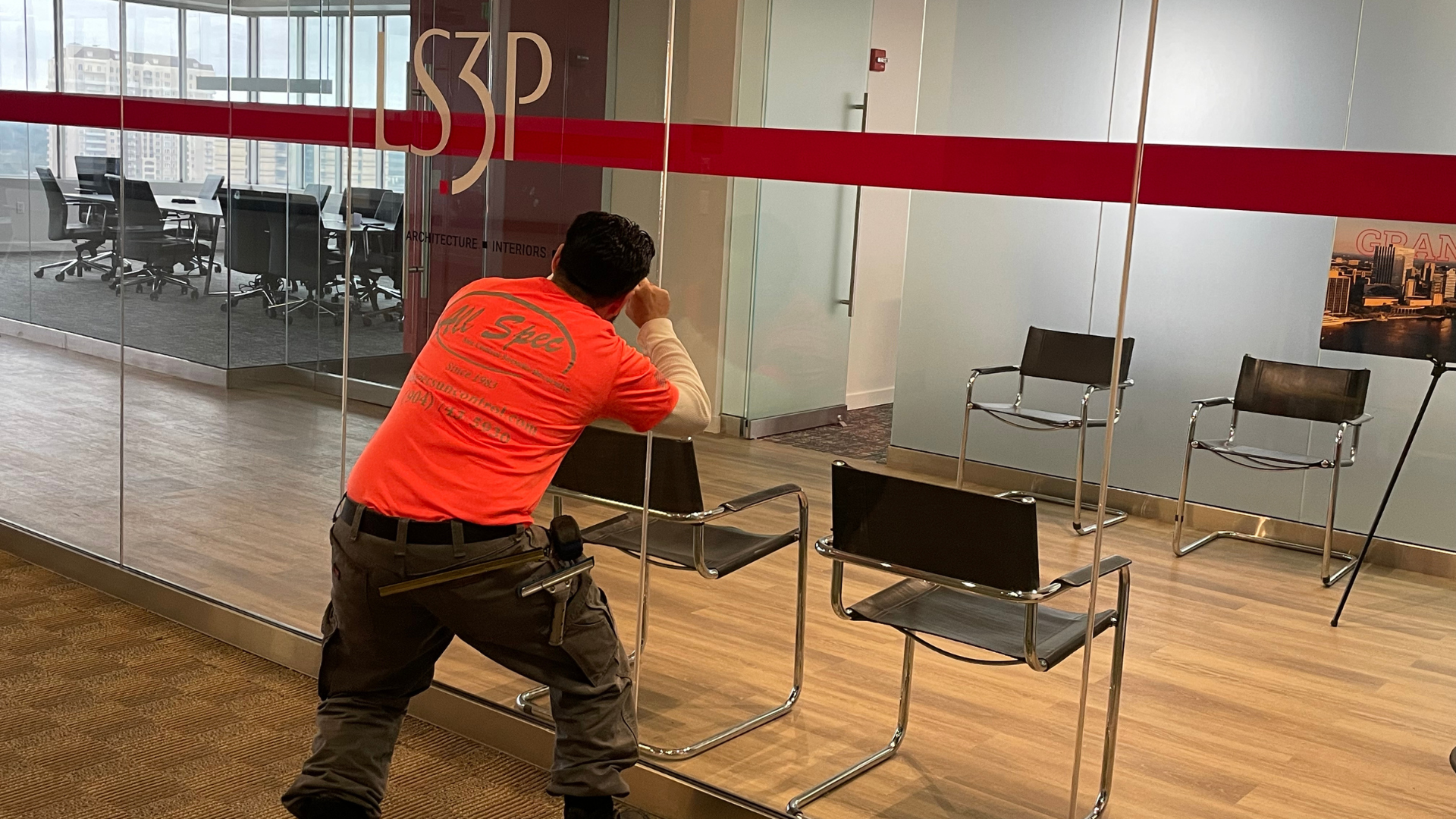
FAQs
Q 1: Is ceramic tint worth the extra cost for commercial buildings?
Ans: Yes, the superior heat rejection typically provides a full return on investment via energy savings within 3-5 years, outperforming standard commercial window film.
Q 1: Will commercial window film installation disrupt my business operations?
Ans: No, installation is quick and non-intrusive, allowing your team to continue working without interruption while we upgrade your glass.
Q 1: How long does commercial window tinting last in the Florida sun?
Ans: High-quality ceramic tint lasts 10-15 years without fading, whereas standard films typically degrade and require replacement within 2-5 years.
Q 1: Can you apply tint to double-pane or Low-E glass?
Ans: Yes, modern commercial glass tinting is completely safe for double-pane units and is compatible with existing Low-E coatings.
Q 1: Does commercial tint provide security against break-ins?
Ans: Yes, specific safety-grade films are available that hold shattered glass together to deter intruders and protect against storms.
Conclusion
Ceramic window tint represents the superior long-term solution for commercial glass tinting in Jacksonville, Florida. While standard film offers initial cost savings, ceramic tint’s exceptional heat rejection, maximum UV protection, and extended durability deliver measurable financial benefits that outweigh the higher upfront investment.
For businesses committed to energy efficiency, employee comfort, and operational reliability, ceramic window tinting is an investment that pays dividends year after year.
Ready to Upgrade Your Commercial Glass? Contact All Spec Sun Control today for a free consultation. Our expert team is ready to help you evaluate your unique situation and recommend the optimal solution for your commercial property.

